Layout:
Showing 21-30 of 84
-
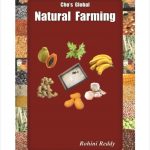 Cho’s Global Natural Farming
Title of document: Cho’s Global Natural Farming Authors/editor: Rohini Reddy Journal’s name if any: Ministry/Government Agency/Organisation: SARRA Year of publication: 2011 Geographic focus: South of Korea Main issues / topics addressed (for example:…) School of agroecology (if any): Web address to original document (if any): Summary: Dr Cho’s natural farming system connects seed to an in alienating part of the microbial world of nature. Very life on earth is said to be of microbial ministration and to think of life without microbes is next to impossible. Human body for example consists of 100 trillion cells and 90 trillion cells belong to microbes. So is the case in terms of the earth’s bio-diversity of species whether seed or breed can co-exist in the midst of teaming microbial millions. Dr. chos Natural farming technologies emphasizing on IMO’s multiplication in various ways. The technologies are relevant to preserve the native varieties and bio diversity by farming community. Read MoreALiSEA teams 86 downloads
Cho’s Global Natural Farming
Title of document: Cho’s Global Natural Farming Authors/editor: Rohini Reddy Journal’s name if any: Ministry/Government Agency/Organisation: SARRA Year of publication: 2011 Geographic focus: South of Korea Main issues / topics addressed (for example:…) School of agroecology (if any): Web address to original document (if any): Summary: Dr Cho’s natural farming system connects seed to an in alienating part of the microbial world of nature. Very life on earth is said to be of microbial ministration and to think of life without microbes is next to impossible. Human body for example consists of 100 trillion cells and 90 trillion cells belong to microbes. So is the case in terms of the earth’s bio-diversity of species whether seed or breed can co-exist in the midst of teaming microbial millions. Dr. chos Natural farming technologies emphasizing on IMO’s multiplication in various ways. The technologies are relevant to preserve the native varieties and bio diversity by farming community. Read MoreALiSEA teams 86 downloads -
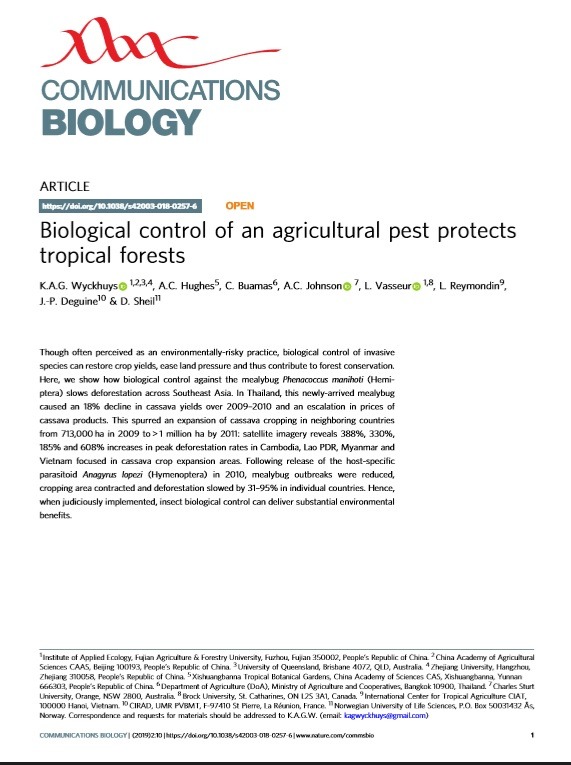 Biological control of an agricultural pest protects tropical forests
Title of document: Biological control of an agricultural pest protects tropical forests Authors: K.A.G. Wyckhuys, A.C. Hughes, C. Buamas, A.C. Johnson, L. Vasseur, L. Reymondin, J.-P. Deguine & D. Sheil Journal’s name if any: Ministry/Government Agency/Organisation: Communications Biology Year of publication: 2019 Geographic focus: ASEAN Main issues / topics addressed (for example:…) School of agroecology (if any): Web address to original document (if any): https://www.nature.com/articles/s42003-018-0257-6 Summary: Article “Biological control of an agricultural pest protects tropical forests” Read MoreALiSEA teams 12 downloads
Biological control of an agricultural pest protects tropical forests
Title of document: Biological control of an agricultural pest protects tropical forests Authors: K.A.G. Wyckhuys, A.C. Hughes, C. Buamas, A.C. Johnson, L. Vasseur, L. Reymondin, J.-P. Deguine & D. Sheil Journal’s name if any: Ministry/Government Agency/Organisation: Communications Biology Year of publication: 2019 Geographic focus: ASEAN Main issues / topics addressed (for example:…) School of agroecology (if any): Web address to original document (if any): https://www.nature.com/articles/s42003-018-0257-6 Summary: Article “Biological control of an agricultural pest protects tropical forests” Read MoreALiSEA teams 12 downloads -
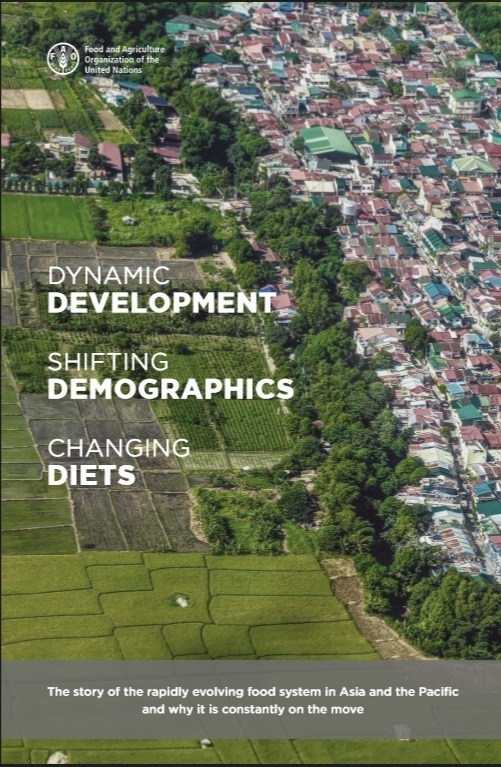 Dynamic development, shifting demographics, changing diets
Title of document: Dynamic development, shifting demographics, changing diets Authors: FAO Journal’s name if any: Ministry/Government Agency/Organisation: FAO Year of publication: 2018 Geographic focus: Asia and the Pacific Main issues / topics addressed (for example: Introduction; Mega trends in Asia and the Pacific; Environmental degradation and climate change threaten; Diets are diversifying with implications for farmers and nutrition…) School of agroecology (if any): Web address to original document (if any): www.fao.org/3/i8499en/i8499EN.pdf Summary: The story of the rapidly evolving food system in Asia and the Pacific and why it is constantly on the move Read MoreALiSEA teams 5 downloads
Dynamic development, shifting demographics, changing diets
Title of document: Dynamic development, shifting demographics, changing diets Authors: FAO Journal’s name if any: Ministry/Government Agency/Organisation: FAO Year of publication: 2018 Geographic focus: Asia and the Pacific Main issues / topics addressed (for example: Introduction; Mega trends in Asia and the Pacific; Environmental degradation and climate change threaten; Diets are diversifying with implications for farmers and nutrition…) School of agroecology (if any): Web address to original document (if any): www.fao.org/3/i8499en/i8499EN.pdf Summary: The story of the rapidly evolving food system in Asia and the Pacific and why it is constantly on the move Read MoreALiSEA teams 5 downloads -
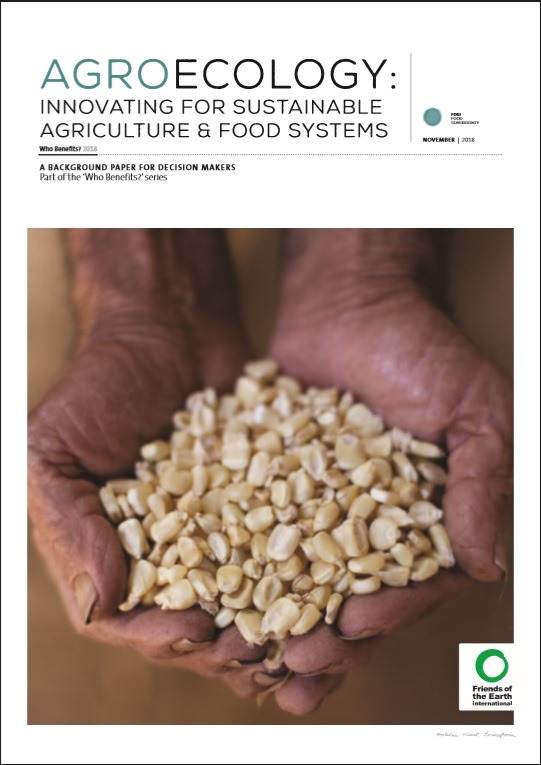 Agroecology: Innovating for sustainable agriculture & food systems
Title of document: Agroecology: Innovating for sustainable agriculture & food systems Authors: Delphine Ortega-Espès Journal’s name if any: Ministry/Government Agency/Organisation: Friends of the Earth International Year of publication: 2018 Geographic focus: Global level Main issues / topics addressed (for example: What innovations are needed to eradicate hunger & achieve sustainable agriculture; Why agroecology is the innovative approach to be supported …) School of agroecology (if any): Web address to original document (if any): https://www.foei.org/resources/publications/agroecology-innovating-for-sustainable-food-systems-and-agriculture Summary: Industrial food production contributes heavily towards climate change, environmental degradation and the depletion of natural resources – and in so doing it erodes the very basis of agriculture. We urgently need to innovate our way out of this agrifood crisis, but we have to be clear about the kind of innovations we want. In this new background paper for decision-makers, Friends of the Earth International explores a systemic change of our food and agricultural systems based on innovations in agroecology, a proposal that is rapidly gaining ground worldwide. A growing body of scientific evidence shows that agroecology innovations and practices are technically feasible, affordable, politically, socially and culturally acceptable, adaptable to local circumstances and environmentally sound. These practices are rooted in ancestral and customary knowledge and practices of peasants, indigenous peoples and other small-scale food providers and many have already been successfully tested in farmers’ fields. Read MoreALiSEA teams 22 downloads
Agroecology: Innovating for sustainable agriculture & food systems
Title of document: Agroecology: Innovating for sustainable agriculture & food systems Authors: Delphine Ortega-Espès Journal’s name if any: Ministry/Government Agency/Organisation: Friends of the Earth International Year of publication: 2018 Geographic focus: Global level Main issues / topics addressed (for example: What innovations are needed to eradicate hunger & achieve sustainable agriculture; Why agroecology is the innovative approach to be supported …) School of agroecology (if any): Web address to original document (if any): https://www.foei.org/resources/publications/agroecology-innovating-for-sustainable-food-systems-and-agriculture Summary: Industrial food production contributes heavily towards climate change, environmental degradation and the depletion of natural resources – and in so doing it erodes the very basis of agriculture. We urgently need to innovate our way out of this agrifood crisis, but we have to be clear about the kind of innovations we want. In this new background paper for decision-makers, Friends of the Earth International explores a systemic change of our food and agricultural systems based on innovations in agroecology, a proposal that is rapidly gaining ground worldwide. A growing body of scientific evidence shows that agroecology innovations and practices are technically feasible, affordable, politically, socially and culturally acceptable, adaptable to local circumstances and environmentally sound. These practices are rooted in ancestral and customary knowledge and practices of peasants, indigenous peoples and other small-scale food providers and many have already been successfully tested in farmers’ fields. Read MoreALiSEA teams 22 downloads -
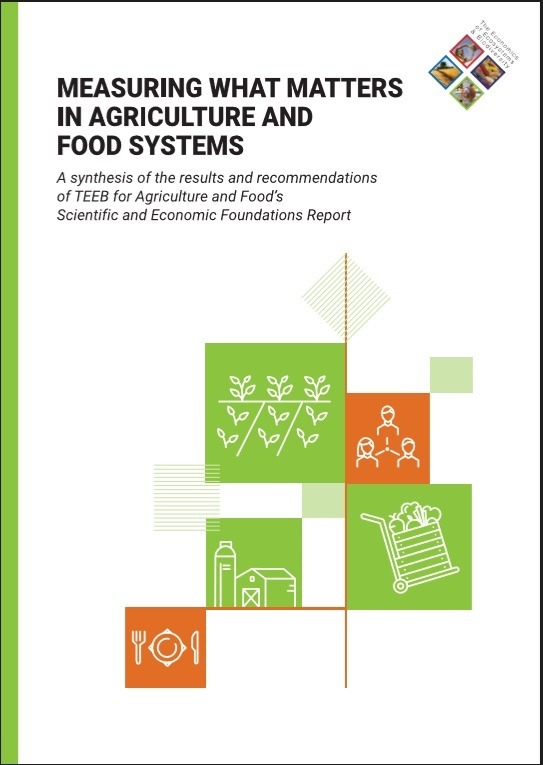 Measuring what matters in agriculture and food systems: A synthesis of the results and recommendations of TEEB for Agriculture and Food’s Scientific and Economic Foundations Report
Title of document: Measuring what matters in agriculture and food systems: A synthesis of the results and recommendations of TEEB for Agriculture and Food’s Scientific and Economic Foundations Report Authors: Alexander Müller and Pavan Sukhdev Journal’s name if any: Ministry/Government Agency/Organisation: UN Environment Year of publication: 2018 Geographic focus: Global level Main issues / topics addressed (for example: The challenges of agriculture and food systems in the 21st century: five different perspectives; Why eco-agri-food systems can only be understood with a systems perspective; The complex reality of eco-agri-food systems…) School of agroecology (if any): Web address to original document (if any): http://teebweb.org/agrifood/measuring-what-matters-in-agriculture-and-food-systems/ Summary: The Economics of Ecosystems and Biodiversity (TEEB) (2018). Measuring what matters in agriculture and food systems: a synthesis of the results and recommendations of TEEB for Agriculture and Food’s Scientific and Economic Foundations report. Geneva: UN Environment. Read MoreALiSEA teams 9 downloads
Measuring what matters in agriculture and food systems: A synthesis of the results and recommendations of TEEB for Agriculture and Food’s Scientific and Economic Foundations Report
Title of document: Measuring what matters in agriculture and food systems: A synthesis of the results and recommendations of TEEB for Agriculture and Food’s Scientific and Economic Foundations Report Authors: Alexander Müller and Pavan Sukhdev Journal’s name if any: Ministry/Government Agency/Organisation: UN Environment Year of publication: 2018 Geographic focus: Global level Main issues / topics addressed (for example: The challenges of agriculture and food systems in the 21st century: five different perspectives; Why eco-agri-food systems can only be understood with a systems perspective; The complex reality of eco-agri-food systems…) School of agroecology (if any): Web address to original document (if any): http://teebweb.org/agrifood/measuring-what-matters-in-agriculture-and-food-systems/ Summary: The Economics of Ecosystems and Biodiversity (TEEB) (2018). Measuring what matters in agriculture and food systems: a synthesis of the results and recommendations of TEEB for Agriculture and Food’s Scientific and Economic Foundations report. Geneva: UN Environment. Read MoreALiSEA teams 9 downloads -
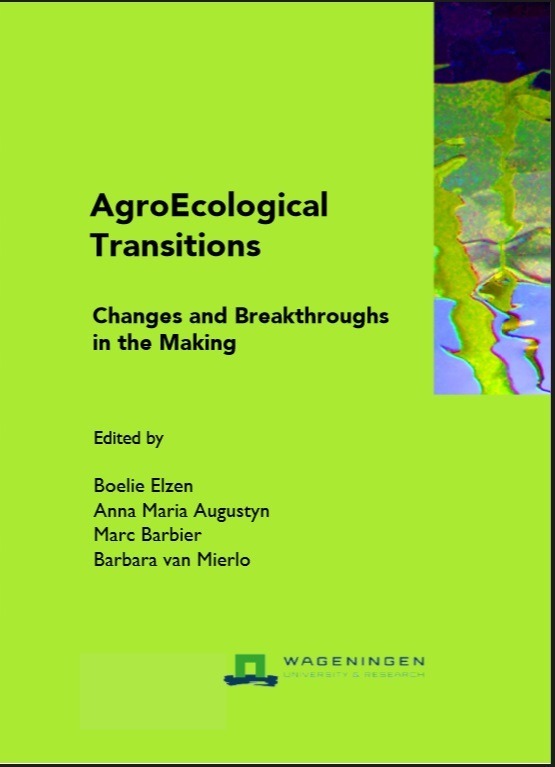 Agroecological Transitions - Changes and Breakthroughs in the Making
Title of document: Agroecological Transitions - Changes and Breakthroughs in the Making Authors: Boelie Elzen, Anna Maria Augustyn, Marc Barbier, Barbara van Mierlo Journal’s name if any: Ministry/Government Agency/Organisation: Wageningen University & Research Year of publication: 2017 Geographic focus: Global level Main issues / topics addressed (for example: Learning in niches; Niche-regime interactions Regime transformations; Conclusion…) School of agroecology (if any): Web address to original document (if any): https://www.wur.nl/en/Publication-details.htm?publicationId=publication-way-353136383035 Summary: To underline the need for radical, systemic changes, we have chosen the term “AgroEcological Transitions” for the title of this volume. It stresses that a transition towards sustainable agriculture requires more than improving agribusiness as usual. To us, agroecology refers to broad and varied processes of experimentation and innovation that often start in niches and have the potential of transforming the dominant agri-food system into a more sustainable one. Analysing these ongoing processes will increase our understanding of transformative change. The chapters of this book reflect the need for such insights by analysing a broad variety of agroecological ‘breakthroughs-in-the-making Read MoreALiSEA teams 14 downloads
Agroecological Transitions - Changes and Breakthroughs in the Making
Title of document: Agroecological Transitions - Changes and Breakthroughs in the Making Authors: Boelie Elzen, Anna Maria Augustyn, Marc Barbier, Barbara van Mierlo Journal’s name if any: Ministry/Government Agency/Organisation: Wageningen University & Research Year of publication: 2017 Geographic focus: Global level Main issues / topics addressed (for example: Learning in niches; Niche-regime interactions Regime transformations; Conclusion…) School of agroecology (if any): Web address to original document (if any): https://www.wur.nl/en/Publication-details.htm?publicationId=publication-way-353136383035 Summary: To underline the need for radical, systemic changes, we have chosen the term “AgroEcological Transitions” for the title of this volume. It stresses that a transition towards sustainable agriculture requires more than improving agribusiness as usual. To us, agroecology refers to broad and varied processes of experimentation and innovation that often start in niches and have the potential of transforming the dominant agri-food system into a more sustainable one. Analysing these ongoing processes will increase our understanding of transformative change. The chapters of this book reflect the need for such insights by analysing a broad variety of agroecological ‘breakthroughs-in-the-making Read MoreALiSEA teams 14 downloads -
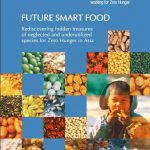 Future Smart Food: Rediscovering hidden treasures of neglected and underutilized species for Zero Hunger in Asia
Title of document: Future Smart Food: Rediscovering hidden treasures of neglected and underutilized species for Zero Hunger in Asia Authors: Xuan Li and Kadambot H.M. Siddique Journal’s name if any: Ministry/Government Agency/Organisation: FAO Year of publication: 2018 Geographic focus: Asia & Mekong region Main issues / topics addressed (for example: Enabling environment required to promote future smart food production, 33 marketing and consumption; Country scoping and prioritization studies …) School of agroecology (if any): Web address to original document (if any): http://www.fao.org/documents/card/en/c/I8907EN/ Summary: For centuries people in Asia and the Pacific region have grown and consumed a wide variety of nutritious foods. Unfortunately, more recent generations have slowly but surely changed their diets and have moved away from many of these traditional foods. The Food and Agriculture Organization of the United Nations (FAO) is working with our Member Countries to reinvigorate both production and consumption of these crops – often referred to as neglected and underutilized species (NUS). This work is consistent with FAO’s role in providing support to countries to meet the targets of the Sustainable Development Goals (SDGs), primarily, but not limited to, SDG2 which aims to achieve Zero Hunger, specifically to “end hunger, achieve food security and improved nutrition, and promote sustainable agriculture” by 2030. The Zero Hunger goal implies that no one should be left behind. The Asia-Pacific region is home to most of the world’s undernourished people (490 million). Other forms of malnutrition remain challenging, including stunting and micronutrient deficiencies. While in some countries there are rising rates of overweight and obesity. The issues are manifest in both the demand side and supply side. On the demand side, there is population growth, urbanization, migration, and the changing consumption associated with rising incomes. On the supply side, the combined effects of climate change, declining agricultural biodiversity, water scarcity, land scarcity, and degradation of natural resources are threatening world food security. Read MoreALiSEA teams 24 downloads
Future Smart Food: Rediscovering hidden treasures of neglected and underutilized species for Zero Hunger in Asia
Title of document: Future Smart Food: Rediscovering hidden treasures of neglected and underutilized species for Zero Hunger in Asia Authors: Xuan Li and Kadambot H.M. Siddique Journal’s name if any: Ministry/Government Agency/Organisation: FAO Year of publication: 2018 Geographic focus: Asia & Mekong region Main issues / topics addressed (for example: Enabling environment required to promote future smart food production, 33 marketing and consumption; Country scoping and prioritization studies …) School of agroecology (if any): Web address to original document (if any): http://www.fao.org/documents/card/en/c/I8907EN/ Summary: For centuries people in Asia and the Pacific region have grown and consumed a wide variety of nutritious foods. Unfortunately, more recent generations have slowly but surely changed their diets and have moved away from many of these traditional foods. The Food and Agriculture Organization of the United Nations (FAO) is working with our Member Countries to reinvigorate both production and consumption of these crops – often referred to as neglected and underutilized species (NUS). This work is consistent with FAO’s role in providing support to countries to meet the targets of the Sustainable Development Goals (SDGs), primarily, but not limited to, SDG2 which aims to achieve Zero Hunger, specifically to “end hunger, achieve food security and improved nutrition, and promote sustainable agriculture” by 2030. The Zero Hunger goal implies that no one should be left behind. The Asia-Pacific region is home to most of the world’s undernourished people (490 million). Other forms of malnutrition remain challenging, including stunting and micronutrient deficiencies. While in some countries there are rising rates of overweight and obesity. The issues are manifest in both the demand side and supply side. On the demand side, there is population growth, urbanization, migration, and the changing consumption associated with rising incomes. On the supply side, the combined effects of climate change, declining agricultural biodiversity, water scarcity, land scarcity, and degradation of natural resources are threatening world food security. Read MoreALiSEA teams 24 downloads -
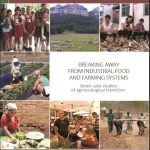 Breaking away from industrial food and farming systems: Seven case studies of agroecological transition
Title of document: Breaking away from industrial food and farming systems: Seven case studies of agroecological transition Authors: Steve Gliessman Journal’s name if any: Ministry/Government Agency/Organisation: IPES-Food Year of publication: 2018 Geographic focus: Asia & Mekong region Main issues / topics addressed (for example: The need for transition in food systems; What do we know about agroecological transitions? ; Case studies; Conclusions …) School of agroecology (if any): Web address to original document (if any): Summary: The seven case studies in this report provide concrete examples of how, in spite of the many barriers to change, people around the world have been able to fundamentally rethink and redesign food systems around agroecological principles Read MoreALiSEA teams 18 downloads
Breaking away from industrial food and farming systems: Seven case studies of agroecological transition
Title of document: Breaking away from industrial food and farming systems: Seven case studies of agroecological transition Authors: Steve Gliessman Journal’s name if any: Ministry/Government Agency/Organisation: IPES-Food Year of publication: 2018 Geographic focus: Asia & Mekong region Main issues / topics addressed (for example: The need for transition in food systems; What do we know about agroecological transitions? ; Case studies; Conclusions …) School of agroecology (if any): Web address to original document (if any): Summary: The seven case studies in this report provide concrete examples of how, in spite of the many barriers to change, people around the world have been able to fundamentally rethink and redesign food systems around agroecological principles Read MoreALiSEA teams 18 downloads -
 The Climate Urgency: Setting sail for a new paradigm
Title of document: The Climate Urgency: Setting sail for a new paradigm Authors: CIDSE Journal’s name if any: Ministry/Government Agency/Organisation: CIDSE Year of publication: 2018 Geographic focus: Asia & Mekong region Main issues / topics addressed (for example: Introduction; CIDSE’S perspective and principles; WHAT ARE CARBON BUDGETS telling us about urgency?; THE ENERGY SECTOR AT THE HEART OF GLOBAL ACTION against climate change……) School of agroecology (if any): Web address to original document (if any): Summary: This report aims to explore how a paradigm shift in our food and energy systems – supported by structural lifestyle and societal changes – could greatly contribute to limit rise in average global temperature to 1.5°C without relying on risky and unproven Negative Emissions Technologies (NETs) or geoengineering Read MoreALiSEA teams 3 downloads
The Climate Urgency: Setting sail for a new paradigm
Title of document: The Climate Urgency: Setting sail for a new paradigm Authors: CIDSE Journal’s name if any: Ministry/Government Agency/Organisation: CIDSE Year of publication: 2018 Geographic focus: Asia & Mekong region Main issues / topics addressed (for example: Introduction; CIDSE’S perspective and principles; WHAT ARE CARBON BUDGETS telling us about urgency?; THE ENERGY SECTOR AT THE HEART OF GLOBAL ACTION against climate change……) School of agroecology (if any): Web address to original document (if any): Summary: This report aims to explore how a paradigm shift in our food and energy systems – supported by structural lifestyle and societal changes – could greatly contribute to limit rise in average global temperature to 1.5°C without relying on risky and unproven Negative Emissions Technologies (NETs) or geoengineering Read MoreALiSEA teams 3 downloads -
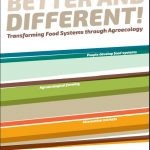 Better and Different “Transforming food systems through agroecology”
Title of document: Better and Different “Transforming food systems through agroecology” Authors: Alessa Heuser, Berit Thomsen, Dr Birgit Wilhelm, Dr Cecilia Rocha, Christine Pohl, Ismael Díaz, Jan Urhahn, Le Nguyet Minh, Melody Mendonça, Dr Olivier De Schutter , Dr Pablo Tittonell, Paula Gioia, Peter Volz, Sarah Schneider, Stig Tanzmann, Dr Wolfgang Sachs Journal’s name if any: Ministry/Government Agency/Organisation: Brot für die Welt, FIAN, Forum Umwelt und Entwicklung, Heinrich-Böll-Stiftung, INKOTA, MISEREOR, Oxfam, and Rosa-Luxemburg-Stiftung Year of publication: 2017 Geographic focus: Global level Main issues / topics addressed (for example: Introduction; People develop food systems; Agroecological farming; Alternative markets……) School of agroecology (if any): Web address to original document (if any): https://webshop.inkota.de/node/1513 Summary: The publication depicts how civil society initiatives play an increasing role in shaping local food systems and how they are drawing up food policy. Various cases from Kenya, Burkina Faso, Vietnam, Nepal, Germany, France, Switzerland, Columbia, and Brazil are presented. Agroecology provides alternatives to the capital-intensive, industrial and export-oriented agriculture, which is guided by corporate interests. Farmers in the global South and North are recognized as central actors in the food system, local markets are strengthened and the independence from mineral oil, chemicals and genetic engineering is promoted. The publication portrays alternatives that have already been successfully implemented and analyzes which political instruments are necessary to support and further spread Agroecology. The readers are invited to advocate for a socially just and environmentally sustainable reorientation in the agricultural sector. Read MoreALiSEA teams 18 downloads
Better and Different “Transforming food systems through agroecology”
Title of document: Better and Different “Transforming food systems through agroecology” Authors: Alessa Heuser, Berit Thomsen, Dr Birgit Wilhelm, Dr Cecilia Rocha, Christine Pohl, Ismael Díaz, Jan Urhahn, Le Nguyet Minh, Melody Mendonça, Dr Olivier De Schutter , Dr Pablo Tittonell, Paula Gioia, Peter Volz, Sarah Schneider, Stig Tanzmann, Dr Wolfgang Sachs Journal’s name if any: Ministry/Government Agency/Organisation: Brot für die Welt, FIAN, Forum Umwelt und Entwicklung, Heinrich-Böll-Stiftung, INKOTA, MISEREOR, Oxfam, and Rosa-Luxemburg-Stiftung Year of publication: 2017 Geographic focus: Global level Main issues / topics addressed (for example: Introduction; People develop food systems; Agroecological farming; Alternative markets……) School of agroecology (if any): Web address to original document (if any): https://webshop.inkota.de/node/1513 Summary: The publication depicts how civil society initiatives play an increasing role in shaping local food systems and how they are drawing up food policy. Various cases from Kenya, Burkina Faso, Vietnam, Nepal, Germany, France, Switzerland, Columbia, and Brazil are presented. Agroecology provides alternatives to the capital-intensive, industrial and export-oriented agriculture, which is guided by corporate interests. Farmers in the global South and North are recognized as central actors in the food system, local markets are strengthened and the independence from mineral oil, chemicals and genetic engineering is promoted. The publication portrays alternatives that have already been successfully implemented and analyzes which political instruments are necessary to support and further spread Agroecology. The readers are invited to advocate for a socially just and environmentally sustainable reorientation in the agricultural sector. Read MoreALiSEA teams 18 downloads

 Asia & Mekong Region
Asia & Mekong Region  Cambodia
Cambodia  Laos
Laos  Myanmar
Myanmar  Other
Other  Vietnam
Vietnam